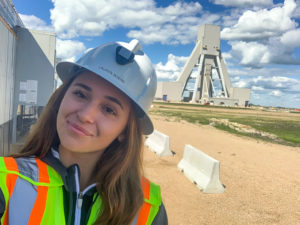
Going into his Professional Experience Year Co-op (PEY Co-op) work term, Noah Guerin (Year 4 ElecE) wanted a taste of the engineering career he could have after graduation — one that would allow him to delve deeper into power and control systems, which he had been studying in his electrical engineering classes.
“I had an idea of what I thought I enjoyed but working in the real world is not the same as learning in a classroom,” he says. “I wanted to know if these areas were something I would want to spend more time in, or if I would even be good at it.“I also wanted to apply this knowledge in different ways, including programming, consulting and analysis.” When he came across a job posting at Quanta Technology — a company that specializes in the electric power and utilities field — it seemed to check all the boxes he was looking for to apply his knowledge in a variety of ways.
The position listed some skills that I didn’t have so I wasn’t putting all my hopes on it, but I still applied,” he says. “I was surprised when I got an interview request, and just days after the interview, I received a job offer.”
Facilitated by U of T’s Engineering Career Centre, the PEY Co-op work term that Guerin completed offers undergraduate engineering students the opportunity to gain full-time, paid work experience over 12 to 16 months.
While this work term begins after students’ third year of study, the PEY Co-op program is a degree-long work-integrated learning journey. It begins in first year with self-reflection and career exploration, followed by learning activities in second year that prepare students for the recruitment process and workplace. The program also supports students in pursuing summer co-op work term opportunities after second year.

Lauren Boers (Year 4 MechE) always knew she wanted to work at Hatch because of the engineering firm’s focus on sustainability and its large scale, but the mechanical engineering student, who also plays on U of T’s women’s basketball team, didn’t plan on doing a PEY Co-op work term because of her busy student-athlete schedule.
Rather, she started working at Hatch in 2021 as a summer mechanical engineering intern at the company’s Mississauga office. When given the opportunity to extend her internship into a 16-month PEY Co-op, she got approval from the Engineering Career Centre and embarked on an “exciting” year that included travel to the Jansen potash mine in Saskatchewan.
“I was working full-time out of the Mississauga office and playing on the Varsity basketball team,” she says. “Later, I had the opportunity to travel and work on site in Saskatchewan. I would travel out for 14 days, working 10-hour shifts, and then come home for seven days, back and forth for a whole summer.
“It was hectic at times, but it was honestly an amazing experience.”
The Jansen potash project is planned to be the world’s largest potash producing mine once it is in operation. The mine will provide potassium-rich salt to create fertilizer for agricultural production.
During her work term, Boers wrote technical specification documents for equipment used across the entire project. She also completed a full specification package — from start to finish, all the way through to picking a vendor — for the project’s underground mining satellite fuel systems. While on site, she worked on the coordination of construction execution and technical deliverables of various scopes of work on the surface and underground.
But a highlight from her co-op was being tasked to come up with a design alternative for one part of the potash mine, where the initial design was no longer feasible.
“I got to create the designs and pitch it to the clients with a full presentation,” she says. “And the clients ended up picking my design, which provided them with substantial cost savings.”
Boers’ time at Hatch helped her discover her niche, project management, and when she graduates in June, she will be returning to the company.
“I’m proud of myself for having the courage to try different things and realize that in the end, it was all worth it because I was able to figure out what my strengths are and what I need to work on,” she says.
“Returning to Hatch is exciting. There are so many opportunities within the company that will make my career so fulfilling. Hatch has projects all around the world — I can really go down any path.”
Guerin, who accepted a full-time position at Quanta that will begin in June, found his co-op experience to be career affirming, especially when he had the opportunity to travel to Chicago. The client trip allowed him to close out a project that involved modelling the transmission line protection system for the Chicago-area electric utility and creating a software tool that allows the client’s engineers to continue making changes to the delivered model in an automated way.
“I started from a data-entry role on the project, and I eventually moved into a more involved project management-like role: assigning and completing tasks, giving the client updates and asking technical questions in bi-weekly meetings,” he says.
“The people, the culture and the work at Quanta were all really great and I am very excited to go back and continue building my career in this field.”
– This story was originally published on the University of Toronto’s Faculty of Applied Science and Engineering News Site on March 14, 2023 by Safa Jinje